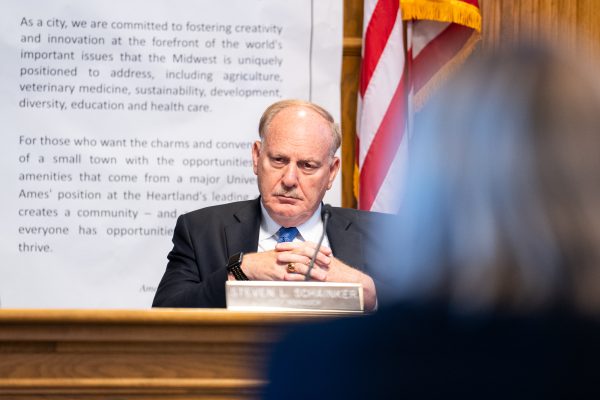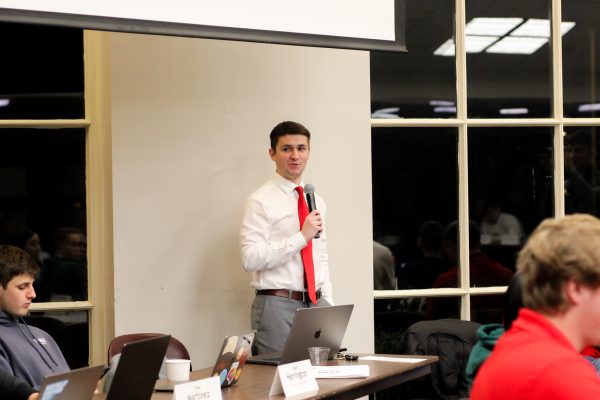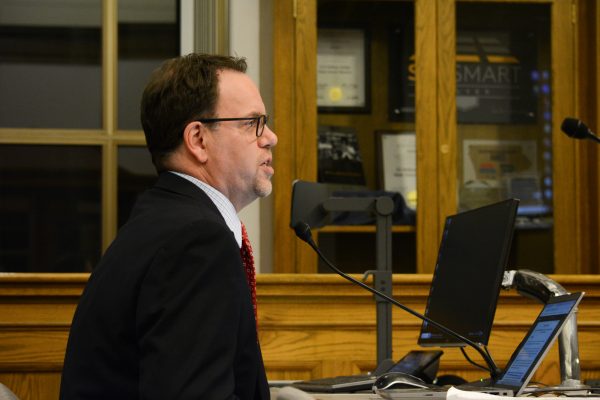Iowa Senate passes child labor law changes amid concerns
Iowa’s state capitol in Des Moines, Iowa
Late into the night of April 18, the Iowa Senate passed Senate File 542, which effectively loosens child labor laws in the state of Iowa. John Winters, an economics professor at Iowa State, said the legislature’s move is in response to the worker shortage.
Under this new legislation, teenagers aged 14 and 15 would be permitted to work six consecutive hours during a single shift–up two hours from the four that were previously allowed.
The bill also allows this age group to work later hours, up to 9 p.m. while school is in session and 11 p.m. from the period of June 1 to Labor Day. Meanwhile, 16 and 17-year-olds can work the same hours as adults.
While Senate File 542 does prohibit children under the age of 16 from working in certain restricted industries, such as manufacturing in most cases, it does list exceptions if the child has parental permission and is a part of a work-based learning program.
The bill also allows those aged 16 and 17 to serve alcohol, lowered from the previous age limit of 18.
“Obviously, we are in a market right now where labor is kind of scarce,” Winters said. “Employers are having trouble finding employees to fill jobs, so it is reasonable to think, ‘Well, where can we look for new workers?’”
Winters said the loosening of labor laws for children could be partially beneficial to their learning.
“The human capital theory of workers is that you learn skills in school, but you can also learn skills on the job,” Winters said. “So in a lot of ways, teens working can be good. For a lot of people, it helps you develop your work ethic and understand what you need to do in terms of being responsible and following through. It can also help you be more social.”
Democratic Sen. Herman Quirmbach, representative of District 25 and former economics professor, said easing the restrictions around the jobs teenagers can work is not the right way to address the workforce shortage.
“There is a workforce shortage,” Quirmbach said. “The unemployment rate is at or near a 50-year low by 3.5 percent. I just don’t think that the right way to fill that shortage is to put teenagers—young teenagers—to work, especially in dangerous jobs.”
Quirmbach expressed worry about the safety of young teenagers under this bill regarding injuries incurred while working and how workers’ compensation will work with teenagers.
“Talking about the work-based learning programs, the workers’ compensation requirements are looser for a young kid getting hurt than for an adult,” Quirmbach said. “One part of the Senate bill places the burden of proof on injured students in workers’ compensation claims. They also have to prove that the business was negligent. Now, normally you do not have to prove that the business was negligent, so it is a higher burden of proof for students who are injured than for an adult worker.”
Quirmbach expressed concerns about the futures of teenagers in the workplace.
“The Senate bill would increase the number of hours a person under the age of 16 may work outside of school to six hours per day while school is in session,” Quirmbach said. “Imagine yourself back when you were in school at 14 years old, 15 years old, trying to put in six hours a day in paid employment on top of attending 7 hours of school during the day […] You are compromising something– I think you are compromising everything.”
Quirmbach also pointed out the problems that could arise with the bill due to some of its language, which contradicts that of federal law.
“There are several ways in which this bill is in direct conflict with federal law,” Quirmbach said. “For example, the Senate version allows 14 and 15-year-olds to work as late as 11 p.m. during summer hours, but federal law during the summer says that you can only work until 9 p.m. and 7 p.m. during the school year. […] Because of the multiple conflicts with federal law, it would not surprise me at all if this bill was the subject of future litigations.”
Charles Taylor, a junior in physics, said he is generally in favor of allowing 14 to 17-year-olds to work a wider range of jobs and hours.
“I think that it’s generally a good idea–almost by case-by-case situation–to allow individuals that are more capable of fulfilling their time with certain jobs to do so if they so desire and it’s agreed upon with the employer and then ergo by the state as well because things like an apprenticeship could be a part of a 14 to 17-year-olds future.”
John Waskow, a senior in community and regional planning, questioned the efficacy of the changes on the workforce.
“You see stuff where it’s like children are allowed to work these crazy night shifts when really, are we really seeing the labor shortages in the night shifts or are we seeing it when people are working?” Waskow said. “The big one, obviously, right now is food service, and so I’m just not sure if opening up children’s night shift is […] going to really affect labor shortages in food service during the day when people are working. I don’t think that’s where we’re seeing the labor shortage.”
Taylor said any concerns regarding the safety of children in the workplace should be extrapolated to all individuals regardless of their age.
“If it’s not safe for a 14-year-old, then it’s probably not safe for a 20 year-old, for a 30-year-old and further,” Taylor said. “If that’s the case, then the whole system needs to be revamped to some degree, whether it’s [in] regard to training, OSHA [Occupational Safety and Health Administration] security, assuming OSHA has evolved, which most of the time it is.”
Taylor said the enforcement of uniform rules across all ages will help keep children in the workplace safe.
“I think that generally speaking, if a 14- to 17-year-old is seeking work, then they’re either seeking work in a less dangerous capacity and […] just trying to make the money, or they’re in a more dangerous capacity, in which case, they are also going to need to have the same safety precautions that everyone else does,” Taylor said.
Waskow expressed concern regarding the impact of the exposure to harmful chemicals on children.
“I think children should be spending– especially high school-aged children – should really be spending their time in school, studying for homework, trying to expose themselves to as much as possible [and] trying to expand their horizons,” Waskow said. “It doesn’t seem right to me to rely on children to fix our labor shortages.”
Waskow stated over email that the bill also raised personal ethical concerns.
“On the subject of ethics, I think children and teenagers shouldn’t be able to work jobs that may be unsafe, entail long hours or take away from their studies and developmental years just to fill a short-term labor shortage,” Waskow stated. “Instead, we should focus on the economic development of our labor force to create educated, skilled people who can contribute greater value and find more fulfilling work.”
Your donation will support the student journalists of the Iowa State Daily. Your contribution will allow us to purchase equipment, send our student journalists to conferences and off-set their cost of living so they can continue to do best-in-the-nation work at the Iowa State Daily.












George | May 2, 2023 at 8:56 am
Exploit children, subject them to risk of harm, expose them to drunks, threaten their school performance, and as a bonus, suppress the need for immigration. All while holding down wages and any form of responsible health care reform for families. Thanks Iowa legislators.
Dave | Jul 31, 2023 at 8:42 am
I respectfully disagree. I’m from an era where most young teens worked, and worked hard. It built character, developed a work ethic, and we learned more than we could at school alone. It prepared us for a future in a much more realistic way, allowed us to feel, and actually be, more independent. Teens should not be viewed as children. We expect so many adult things from them, then try to overprotect them and call them children; usually to their detriment.